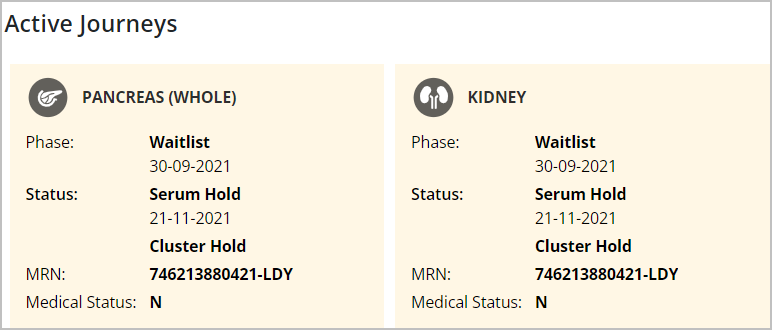About serum holds
Intended audience: recipient coordinator transplant progam admin
Recipients must have a current cPRA score to be included in organ allocations for the following organs:
Heart
Kidney
Pancreas (Whole)
Pancreas (Islets)
VCA
Any cluster involving these organs
cPRA scores are generated by the system on the basis of HLA antibody test results.
If a recipient’s HLA antibody information is missing or has expired (meaning they do not have a current cPRA score), the system automatically applies a serum hold to their waitlisted transplant journey(s).
A transplant journey that is on serum hold continues to accrue wait time, but is not included in organ allocations.
Serum hold triggers
The system places a waitlisted journey on serum hold under the following organ specific conditions.
Organs |
Serum hold is applied when: |
|---|---|
|
Serum holds are not applied. |
|
Journey is added to the waitlist without a cPRA score. |
|
The Sample Draw Date of the most recent HLA antibody test is more than 180 days old. |
|
The Sample Draw Date of the most recent HLA antibody test is more than 150 days old. |
|
Journey is added to the waitlist without a cPRA score. |
|
The Sample Draw Date of the most recent HLA antibody test is more than 180 days old. |
|
Serum holds are not applied. |
|
Cluster is added to the waitlist without a cPRA score. or The Sample Draw Date of the most recent HLA antibody test is more than 180 days old. |
|
Cluster is added to the waitlist without a cPRA score. or The Sample Draw Date of the most recent HLA antibody test is more than 180 days old. |
|
The Sample Draw Date of the most recent HLA antibody test is more than 180 days old. |
|
The Sample Draw Date of the most recent HLA antibody test is more than 180 days old. |
|
No holds apply |
To receive a cPRA score, the recipient’s profile must include at least one complete HLA antibody test.
The system alerts transplant program when the HLA antibody test 60 days from expiry and on the date of expiry.
Lifting a serum hold
A serum hold is lifted when an HLA technologist adds or updates an HLA antibody test and the system generates a cPRA score.
A waitlisted transplant journey may have multiple holds and suspensions applied to it at the same time. Lifting a serum hold does not have any effect on other holds or suspensions.
Determining whether a transplant journey has a serum hold
You can identify which journeys are on serum hold in a variety of ways.
Serum hold notifications
When a serum hold is applied, the system sends a notification to the recipient’s transplant program.
Identifying serum holds in a recipient profile summary
Go to the recipient’s profile.
-
The summary section at the top of the profile page presents an overview of all transplant journeys along with their status.

Identifying serum holds in the waitlist history table
-
Go to the recipient’s profile, then select Organ > Waitlist (where Organ is the organ transplant journey you want to check for a serum hold).
A table at the top of this section presents historical medical statuses and waitlist status changes.
-
Serum holds are indicated by On Hold: HLA Antibody Serum in the Type column.

If the End Date is blank, the journey is still on serum hold.
The Days column indicates how long the journey has been on serum hold.
The Details column indicates whether the hold is caused by missing or expired HLA antibody information.
Filtering the waitlist summary for serum holds
You can create a waitlist summary customized to filter for serum holds.
-
Select Waitlist from the main menu at the top of the page.
A form at the top of the page allows you to specify your search criteria.
In addition to other search criteria, ensure that Include Recipients on Serum Hold is selected.
-
Select the Generate Report button.
In the Results Summary, you can see the total number of Recipients on Serum Hold that matched your search criteria.
-
In the Waitlist Summary list, sort or filter by the Serum Hold column.
If Serum Hold is not visible, select the Columns button to control which columns are displayed.

